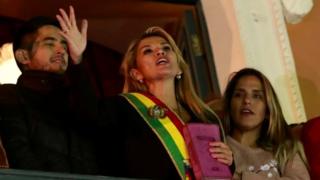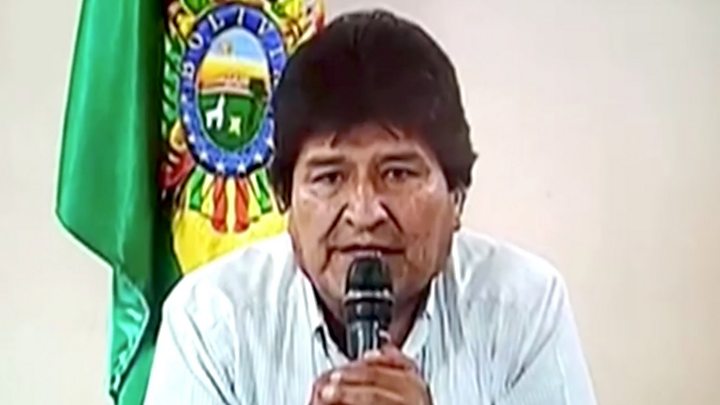Bolivia’s democracy on shaky ground

Image copyright
Reuters
Bolivia’s power vacuum is no longer – the country has a new leader, Jeanine Anez.
But while the news of her appointment was greeted with huge cheers in congress, it was hardly a full house.
Members of Evo Morales’ Mas (Movement Towards Socialism) party, which has a majority in both houses, did not take part in the session, so there was no quorum.
But the country’s constitutional court said that after the resignations of President Evo Morales, his deputy and the presidents of the Senate and Chamber of Deputies, she was the next in line to assume the role without the need of congressional approval.
- Evo Morales’ turbulent run as President of Bolivia
- Bolivia: everything you need to know
- What is happening in Bolivia?
Re-starting the country
Fireworks went off across the city. Even the public cable car system, which had been laying dormant these past few days of uncertainty, started moving as soon as the decision was made.
It was like someone had pressed a switch on getting the country going again.
Image copyright
Reuters
Politicians gathered at the Palacio Quemado presidential palace for a photo shoot. New faces jostled for position after 14 years in opposition.
Also in that crowd was Luis Fernando Camacho, a conservative protest leader from Santa Cruz who has risen in prominence in these weeks of unrest.
I asked him how Bolivia could repair the divisions in the country. He answered briefly: “Bolivia is now at peace.”
Image copyright
Reuters
Protests continue
But the streets of La Paz on Tuesday showed little of that tranquillity he talks about. The departure of Mr Morales – who is now in Mexico where he sought asylum – has heightened tensions and polarised the nation.
On Tuesday, thousands of people from El Alto – Bolivia’s second-biggest city – marched to the capital, La Paz, which sits just beneath it.
With a large indigenous community composed of transplanted rural workers, El Alto is a traditional stronghold for Evo Morales.
Image copyright
Reuters
Many of them were clutching the multicoloured Wiphala, a symbol of indigenous Andean communities.
The flag, although not political, has come to be associated with Evo Morales. As the country’s first indigenous president, many credit him with giving them a more powerful voice.
Calls for respect
“Respect the Wiphala,” they chanted, angry that during protests, the flag had been burned by those opposing Mr Morales.
Respect is a word that you hear a lot in Bolivia at the moment.
This started with accusations that Evo Morales didn’t respect the country’s institutions, or the country’s democracy.
It has morphed into new concerns about respecting the constitution, the political process… and what concerns most poorer Bolivians is the respect of the people.

Media playback is unsupported on your device
Nobody on the march felt listened to, many are afraid of what is to come if a right-wing leader takes Evo Morales’ place.
“The opposition has cheated us,” screamed one woman in the march. “I will always love you Evo, wherever you are.”
One of the biggest challenges facing Bolivia’s politicians in the coming weeks will be trying to encourage the Mas party to accept Evo is no longer in power.
“They have to understand that he’s gone,” says opposition politician Lourdes Millares.
“They have to find who to replace Evo Morales with and recognise that what we have to do now is contribute to the peace in the country and the consolidation of democracy.”
As President Anez came out on the balcony of the Palacio Quemado, clutching a large Bible in her hand, her team shouted, “Yes, we could”.
But she has just 90 days to hold elections – many doubt she can.



0 comments